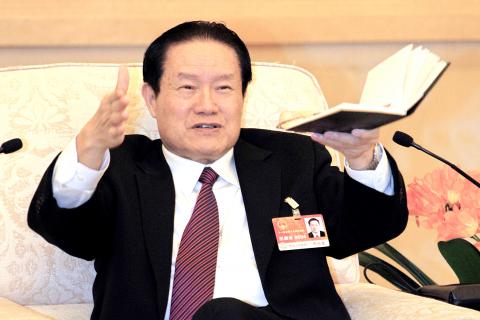China’s leaders have endorsed a corruption investigation into a former security czar who was until recently one of the country’s most powerful politicians, a newspaper said yesterday, in what would make him the most senior official targeted for graft in decades.
Rumors about an investigation into Zhou Yongkang (周永康) began swirling as early as April of last year because of his close association with disgraced politician Bo Xilai (薄熙來), who became embroiled in a scandal over his wife’s murder of a British businessman and who stood trial last week for corruption and abuse of power.
Hong Kong’s English-language South China Morning Post, quoting sources “familiar with the leadership’s thinking,” said China’s current and retired leaders reached the decision to investigate Zhou, who oversaw China’s state security apparatus and served on the Politburo Standing Committee.

Photo: REUTERS
The decision was made early this month during a meeting at a seaside town, the report said.
The newspaper’s report said the investigation will focus on oilfield and property deals that have benefited Zhou and his family. The report could not be independently verified. Requests for comment were faxed to the State Council Information Office, the Cabinet’s press office, and the Chinese Communist Party’s propaganda department, while calls to the Ministry of Supervision rang unanswered.
It has been decades since a Politburo Standing Committee member has been prosecuted by China’s judiciary. The reported investigation into Zhou, 70, may illustrate the new leadership’s determination to exempt nobody in its fight against corruption.
However, in a political system in which graft is rampant, corruption probes into senior officials have often carried political overtones. Prosecutions of officials on graft charges are perceived as moves to ostracize those who have been defeated in factional struggles, without publicizing details of infighting that depict party leaders in a state of disunity.

AGING: As of last month, people aged 65 or older accounted for 20.06 percent of the total population and the number of couples who got married fell by 18,685 from 2024 Taiwan has surpassed South Korea as the country least willing to have children, with an annual crude birthrate of 4.62 per 1,000 people, Ministry of the Interior data showed yesterday. The nation was previously ranked the second-lowest country in terms of total fertility rate, or the average number of children a woman has in her lifetime. However, South Korea’s fertility rate began to recover from 2023, with total fertility rate rising from 0.72 and estimated to reach 0.82 to 0.85 by last year, and the crude birthrate projected at 6.7 per 1,000 people. Japan’s crude birthrate was projected to fall below six,

Conflict with Taiwan could leave China with “massive economic disruption, catastrophic military losses, significant social unrest, and devastating sanctions,” a US think tank said in a report released on Monday. The German Marshall Fund released a report titled If China Attacks Taiwan: The Consequences for China of “Minor Conflict” and “Major War” Scenarios. The report details the “massive” economic, military, social and international costs to China in the event of a minor conflict or major war with Taiwan, estimating that the Chinese People’s Liberation Army (PLA) could sustain losses of more than half of its active-duty ground forces, including 100,000 troops. Understanding Chinese

US President Donald Trump in an interview with the New York Times published on Thursday said that “it’s up to” Chinese President Xi Jinping (習近平) what China does on Taiwan, but that he would be “very unhappy” with a change in the “status quo.” “He [Xi] considers it to be a part of China, and that’s up to him what he’s going to be doing, but I’ve expressed to him that I would be very unhappy if he did that, and I don’t think he’ll do that. I hope he doesn’t do that,” Trump said. Trump made the comments in the context

SELF-DEFENSE: Tokyo has accelerated its spending goal and its defense minister said the nation needs to discuss whether it should develop nuclear-powered submarines China is ramping up objections to what it sees as Japan’s desire to acquire nuclear weapons, despite Tokyo’s longstanding renunciation of such arms, deepening another fissure in the two neighbors’ increasingly tense ties. In what appears to be a concerted effort, China’s foreign and defense ministries issued statements on Thursday condemning alleged remilitarism efforts by Tokyo. The remarks came as two of the country’s top think tanks jointly issued a 29-page report framing actions by “right-wing forces” in Japan as posing a “serious threat” to world peace. While that report did not define “right-wing forces,” the Chinese Ministry of Foreign Affairs was